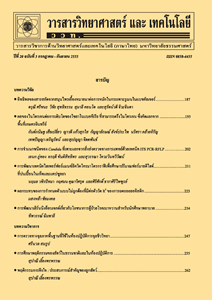ผลของความเป็นกรด-ด่างของดินและปุ๋ยฟอสฟอรัสต่อประสิทธิภาพของราอาร์บัสคูลาร์ไมคอร์ไรซา Glomus intraradices ที่มีต่อข้าวโพดที่ปลูกในดินอุดมสมบูรณ์ต่ำ
Main Article Content
Abstract
Abstract
A study on effects of soil pH and phosphorus fertilizer on efficiency of arbuscular mycorrhizal (AM) fungi, Glomus intraradices, for hybrid field corn growing in infertile soil (Korat soil series) was conducted in 4 x 2 x 2 factorial in CRD with 4 replications. The study consisted of 3 factors. The factor 1 was soil pH (no soil pH adjustment (pH 4.37) and soil pH adjustment to 5.0, 6.0 and 7.0). The factor 2 was phosphorus (P) fertilizer (nil P and 100 % P fertilizer at recommendation rate by site specific nutrient program). The factor 3 was AM fungi (without and with AM inoculation). The corn was grown until harvesting period in sterilized soil. The results revealed that the AM inoculation can increase the growth, yield and P content of corn at all level of soil pH. Inoculation of AM fungi alone had resulted in higher growth, yield and P content of corn than 100 % P fertilizer. There was no significant difference between AM inoculation alone and AM inoculation with 100 % P fertilizer. However, the efficiency of AM fungi had decreased when applying P fertilizer at all level of soil pH. Therefore, these results indicated that soil pH did not have any effects on efficiency of AM fungi, but P fertilizer did. However, AM inoculation can be applied to corn that growing in infertile soil with all level of soil pH by without P fertilization.
Keywords: arbuscular mycorrhizal fungi; infertile soil; phosphorus fertilizer; soil pH
Article Details
References
[2] คณาจารย์ภาควิชาปฐพีวิทยา, 2548, ปฐพีวิทยาเบื้องต้น, พิมพ์ครั้งที่ 10, สำนักพิมพ์ มหาวิทยาลัยเกษตรศาสตร์, กรุงเทพฯ, 547 น.
[3] Drew, E.A., Murray, R.S., Smith, S.E. and Jakobsen, I., 2003, Beyond the rhizosphere: growth and function of AM external hyphae in sands, Plant Soil 251: 105-114.
[4] Miransari, M., Bahrami, H.A., Rejali, F. and Malakouti, M.J., 2009, Effects of arbuscular mycorrhiza, soil sterilization, and soil compaction on wheat (Triticum aestivum L.) nutrients uptake, Soil Till. Res. 104: 48-55.
[5] Smith, S.E. and Read, D.J., 1997, Mycorrhizal Symbiosis, 2nd Ed., Academic Press, London, 605 p.
[6] Piper, C.S., 2010, Soil and Plant Analysis, Shree Publishers, New Delhi, 368 p.
[7] Plenchette, C., Fortin, J.A. and Furlan, B., 1983, Growth responses of several plant species to mycorrhizae in a soil of moderate P-fertility, Part I: Mycorrhizal dependency under field conditions, Plant Soil 70: 199-209.
[8] Phillips, J.M. and Hayman, D.S., 1970, Improved procedures for clearing roots and staining parasitic and vesicular-arbuscular mycorrhizal fungi for rapid assessment of infection, Trans. Br. Mycol. Soc. 55: 158-161.
[9] McGonigle, T.P., Miller, M.H., Evans, D.G., Fairchild, G.L. and Swan, J.A., 1990, A new method which gives an objective measure of colonization of roots by vesicular-arbuscular mycorrhizal fungi, New Phytol. 115: 495-501.
[10] Marschner, H. and Dell, B., 1994, Nutrient uptake in mycorrhizal symbiosis, Plant Soil 159: 89-102.
[11] Sarabia, M., Jakobsen, I., Grønlund, M., Carreon-Abud, Y., and Larsen, J., 2018, Rhizosphere yeasts improve P uptake of a maize arbuscular mycorrhizal association, Appl. Soil Ecol. 125: 18-25.
[12] Liu, L., Li, J., Yue, F., Yan, X., Wang, F., Bloszies, S., and Wang, Y., 2018, Effects of arbuscular mycorrhizal inoculation and biochar amendment on maize growth, cadmium uptake and soil cadmium speciation in Cd-contaminated soil, Chemosphere 194: 495-503.
[13] Ryan, M.H., Norton, R.M., Kirkegaard, J.A., McCormick, K.M., Knights, S.E. and Angus, J.F., 2002, Increasing mycorrhizal colonization does not improve growth and nutrition of wheat on Vertisols in South-Eastern Australia, Aust. J. Agric. Res. 53: 1173-1181.
[14] Fayez, R. and Mahmoud, G., 2006, Interactions between phosphorus availability and an AM fungus (Glomus intraradices) and their effects on soil microbial respiration, biomass and enzyme activities in a calcareous soil, Pedobiologia 50: 413-425.
[15] Abbott, L.K.. and Robson, A.D., 1985, Formation of external hyphae in soil by four species of vesicular-arbuscular mycorrhizal fungi, New Phytol. 97: 437-446.
[16] Wang, G.M., Stribley, D.P., Tinker, P.B. and Walker, C., 1993, Effects of pH on arbuscular mycorrhiza, I. Field observations on the long-term liming experiments at Rothamsted and Woburn, New Phytol. 124: 465-472.


